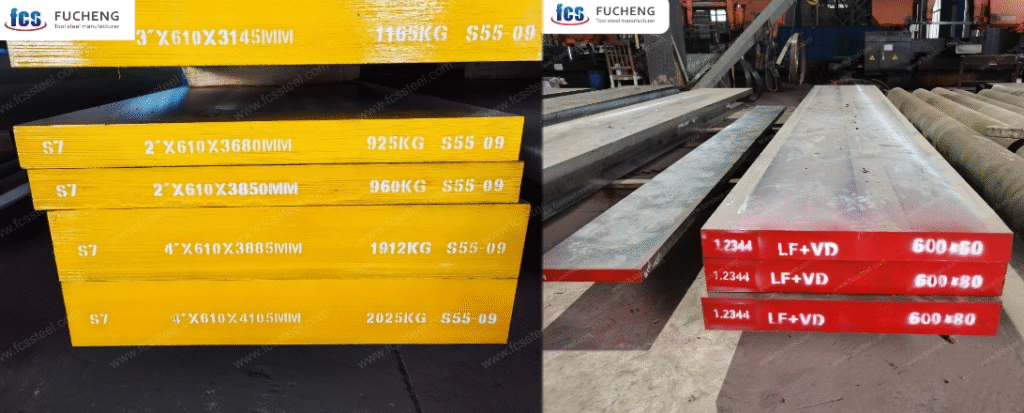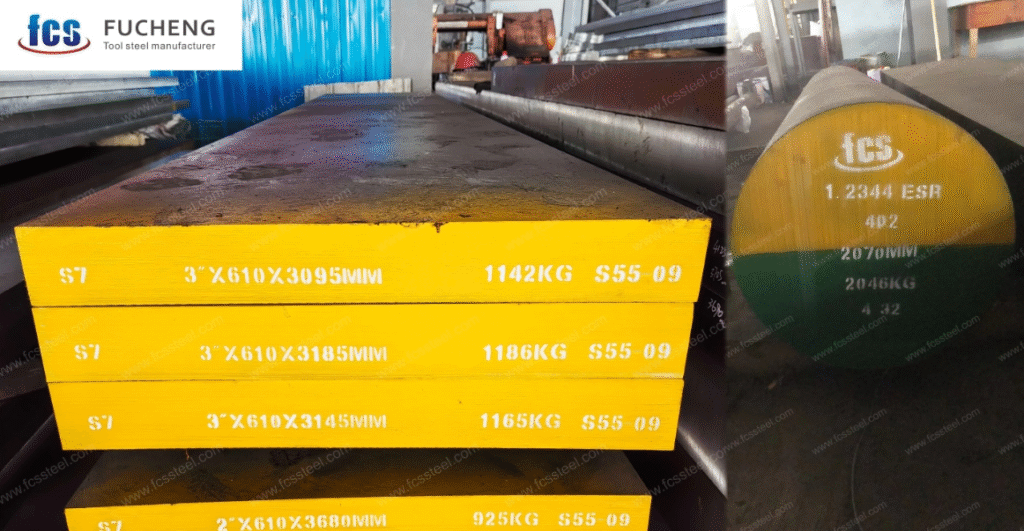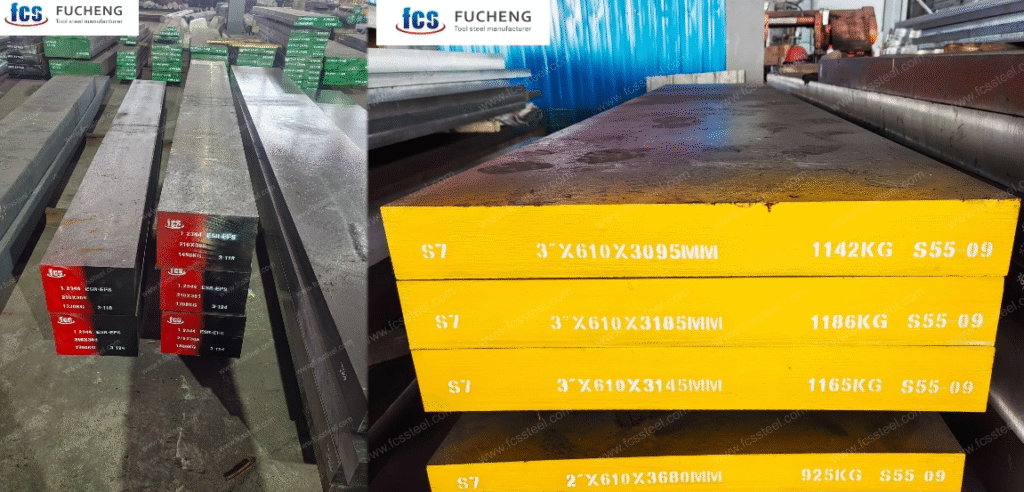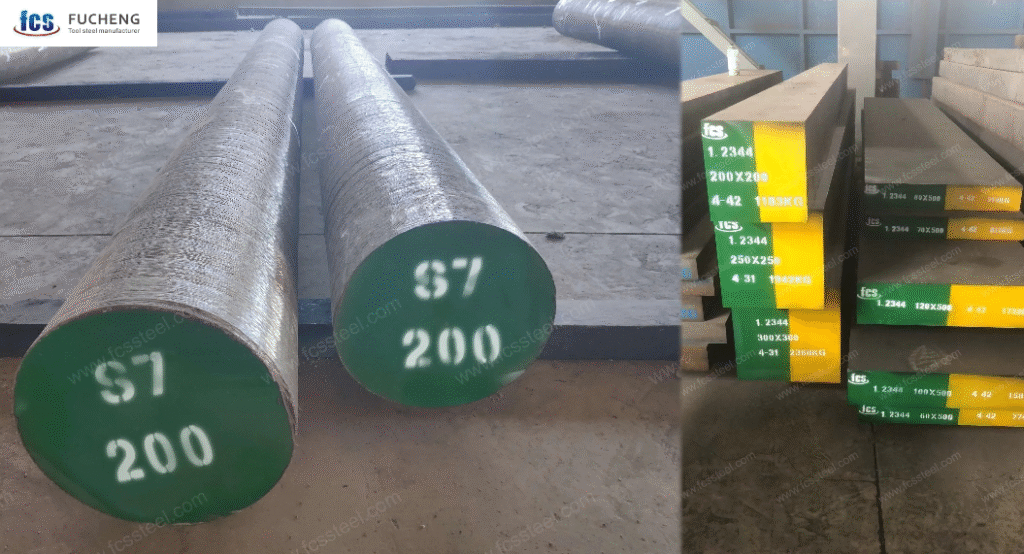Istanbul and its industrial corridor host some of Turkey’s largest forging facilities, supplying components for automotive, construction machinery, shipbuilding, and energy sectors. The choice of tool steel for dies, hammers, and forming tools is a critical decision that directly influences productivity, die life, and cost-per-part.
Two steels are often considered for heavy forging applications:
- S7 Tool Steel (AISI S7): A shock-resistant cold work steel with extremely high toughness and impact resistance.
- 1.2344 Tool Steel (DIN X40CrMoV5-1 / AISI H13): A hot work steel widely recognized for its resistance to thermal fatigue and hot wear.
The debate in Turkish forging shops—particularly in Istanbul’s manufacturing clu
sters—often revolves around a trade-off: “toughness vs. thermal stability.” This article provides a comprehensive, data-driven comparison of S7 vs. 1.2344 steel in the context of Turkey’s heavy forging industry.

1. Chemical Composition and Material Classification
Understanding the metallurgical differences helps explain performance in real-world forging.
| Steel | Standard | Key Alloying Elements | Classification |
|---|---|---|---|
| S7 | AISI S7 | ~0.45% C, 3.25% Cr, 1.4% Mo, 0.25% V | Shock-resistant tool steel (cold work category) |
| 1.2344 | DIN 1.2344 / AISI H13 | ~0.40% C, 5.2% Cr, 1.4% Mo, 1.0% V | Hot work tool steel |
- S7 prioritizes toughness and impact resistance.
- 1.2344 prioritizes hot hardness, resistance to thermal fatigue, and dimensional stability under repeated heating.
2. Forging Conditions in Istanbul’s Heavy Industry
Turkish forging plants typically handle:
- Large automotive components (axles, crankshafts).
- Shipbuilding hardware (shafts, propeller hubs).
- Energy-sector parts (turbine shafts, pressure vessel fittings).
Billet temperatures range 1,000–1,200 °C, and dies must withstand repeated blows from hammers or presses.
- Impact stresses: critical in hammer forging lines.
- Thermal cycling: critical in closed-die hot forging and extrusion operations.
This dual requirement explains why the S7 vs. 1.2344 decision is highly relevant in Istanbul.
3. Impact Resistance and Toughness
- S7 Strengths:
- Exceptional toughness. Charpy impact values can exceed 200 J in hardened condition.
- Suitable for dies subjected to sudden impact and shock.
- Commonly used in cold shearing, punches, and hammer dies.
- 1.2344 Performance:
- Good toughness but lower than S7.
- Better suited for conditions where heat rather than shock is the dominant factor.
👉 In Istanbul’s drop forging hammers, S7 may survive longer due to its shock resistance.
4. Thermal Fatigue and Hot Hardness

- 1.2344 Strengths:
- Retains hardness (~45–52 HRC) even at 500–600 °C.
- Excellent resistance to heat checking and thermal cracking.
- Proven choice for hot forging dies globally.
- S7 Limitations:
- Loses hardness above 300 °C.
- Susceptible to thermal fatigue cracks under continuous high-temperature cycles.
👉 For closed-die forging in Istanbul’s automotive sector, where dies are exposed to red-hot billets repeatedly, 1.2344 is superior.
5. Die Life and Service Cycles
Die service life in Turkey varies depending on forging type.
- S7 typical performance:
- Hammer dies: up to 15,000–20,000 cycles before failure by cracking.
- Hot forging: limited, often <5,000 cycles due to thermal degradation.
- 1.2344 typical performance:
- Hot forging dies: 30,000–50,000 cycles in automotive applications.
- Extrusion dies: life can extend 25–30% longer with nitriding.
👉 Turkish studies published in Journal of Materials Processing Technology report 1.2344 achieves nearly double the cycle life of S7 in hot die forging.
6. Ease of Reconditioning and Repair
In Turkey, die reconditioning is a cost-saving strategy.
- S7:
- Easier to weld-repair due to lower hot hardness.
- However, repeated high-heat exposure weakens properties.
- 1.2344:
- Weldable with suitable filler rods.
- Retains good mechanical properties after multiple heat-treatment cycles.
- Favored for sustainable re-use in Turkish forges.
7. Machinability and Processing Considerations

- S7:
- Generally easier to machine in annealed state.
- Less tool wear during CNC operations.
- 1.2344:
- Slightly harder to machine due to higher chromium and vanadium.
- Requires optimized machining strategies but still widely workable.
In Istanbul’s precision die shops, both steels are practical, but machining time for S7 is 10–15% shorter.
8. Cost Factors in Turkey
Cost remains a critical factor for procurement managers.
- Raw Material Pricing (2025 estimates):
- S7: ~€2,800–3,200 per ton.
- 1.2344: ~€3,000–3,400 per ton.
- Lifecycle Cost:
- Despite slightly higher upfront cost, 1.2344 provides lower cost-per-forged-part due to longer die life in hot applications.
- S7 can be cost-effective in impact-heavy, lower-temperature forging.
9. Typical Applications in Istanbul Forging Shops
- Where S7 is Preferred:
- Hammer dies for cold-to-warm forging.
- Shear blades for billet cutting.
- Tooling for high-impact, lower-temperature operations.
- Where 1.2344 is Preferred:
- Hot forging dies for crankshafts, connecting rods.
- Extrusion dies for aluminum and copper alloys.
- Tools for continuous high-heat conditions in press forging.
10. Procurement and Engineering Decision-Making

For Turkish buyers and engineers, the selection between S7 and 1.2344 depends on:
- Primary Stress Factor:
- High shock → S7.
- High heat → 1.2344.
- Operational Priorities:
- Lower upfront cost, ease of machining → S7.
- Longer die life, better thermal fatigue resistance → 1.2344.
- Sustainability Goals in Turkey:
- Companies focusing on circular economy practices (repair, re-use, reduced waste) benefit more from 1.2344’s heat treatment compatibility.
11. Case Insight: Istanbul’s Automotive Forging
A forging plant supplying suspension parts to the Turkish automotive sector compared both steels:
- S7 Dies: Survived ~12,000 cycles before cracking under impact.
- 1.2344 Dies: Lasted ~40,000 cycles before thermal fatigue became limiting.
This direct comparison illustrates why many Turkish plants gradually migrate toward 1.2344 for high-volume hot forging, while retaining S7 for select impact-heavy roles.
Conclusion
The debate between S7 vs. 1.2344 steel is not about which is universally “better,” but about which fits the specific forging environment in Istanbul’s diverse heavy industry.
- S7 excels in toughness and shock resistance, making it a strong candidate for hammer dies, billet shears, and lower-temperature forging tools.
- 1.2344 excels in thermal fatigue resistance and hot hardness, making it indispensable for high-cycle, high-heat closed-die forging and extrusion dies.
For Turkey’s forging sector, where both impact and heat coexist, a hybrid tooling strategy—using S7 in impact-intensive stages and 1.2344 in hot working dies—offers the most balanced, cost-efficient, and technically reliable approach.
By aligning material choice with process demands, Istanbul’s forging companies can achieve longer die life, lower cost-per-part, and improved competitiveness in Europe’s manufacturing value chain.
